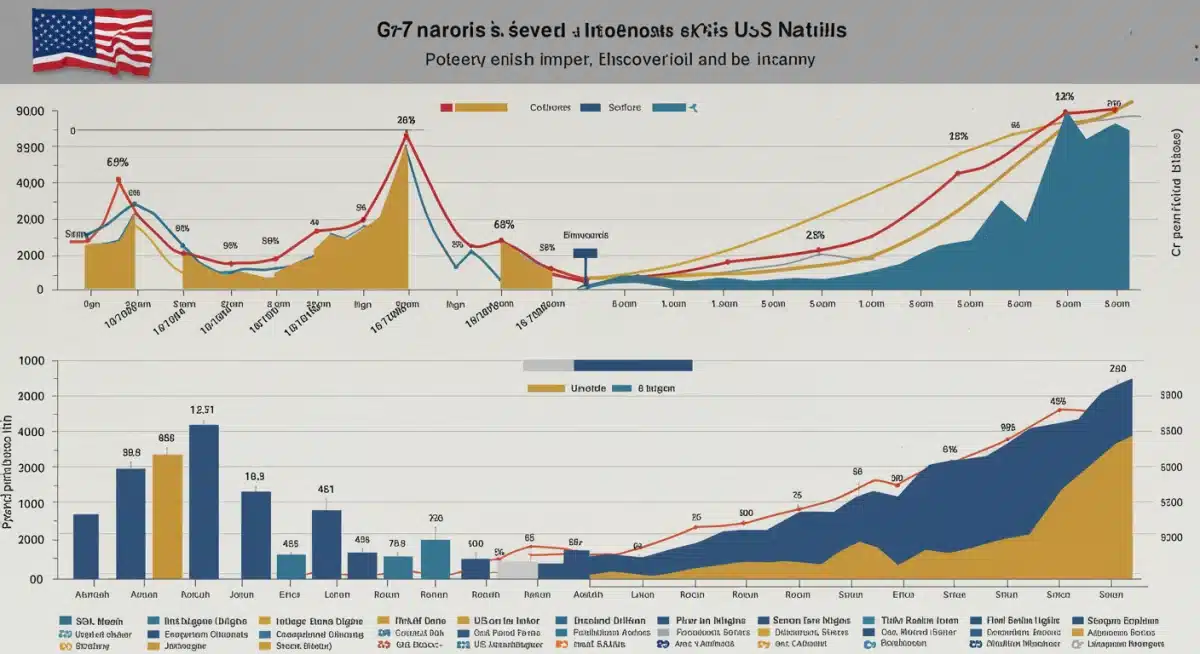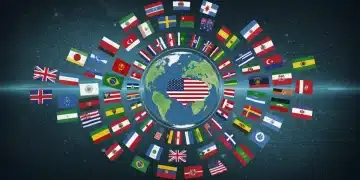2025 G7 Summit Agenda: Key Takeaways for U.S. Economic Stability

The 2025 G7 Summit agenda is poised to address critical global economic challenges, with significant implications for U.S. economic stability, shaping future trade policies, climate initiatives, and geopolitical strategies.
As the global economic landscape continues to evolve at an unprecedented pace, Understanding the 2025 G7 Summit Agenda: Key Takeaways for U.S. Economic Stability becomes paramount for policymakers, businesses, and citizens alike. The upcoming summit represents a crucial juncture where the world’s leading industrialized democracies will convene to tackle pressing issues, the outcomes of which will undoubtedly ripple across the United States economy.
The Geopolitical Context Shaping the 2025 G7 Summit Agenda
The 2025 G7 Summit will not occur in a vacuum; it will be deeply influenced by the prevailing geopolitical climate. Escalating international tensions, ongoing conflicts, and shifting power dynamics among major global players will inevitably frame the discussions. For the U.S., navigating this complex environment is crucial for maintaining its economic position and influence.
The G7, comprising Canada, France, Germany, Italy, Japan, the United Kingdom, and the United States, along with the European Union, serves as a vital forum for coordinating responses to global challenges. The collective economic weight of these nations means their decisions have far-reaching consequences, especially concerning trade, security, and economic resilience.
Emerging Geopolitical Challenges
Several key geopolitical challenges are expected to dominate the G7 discussions, directly impacting U.S. economic stability. These include regional conflicts, energy security, and the rise of protectionist sentiments in various parts of the world. Each of these elements demands a coordinated response to mitigate risks and foster global prosperity.
- Regional Conflicts: The economic repercussions of conflicts, such as supply chain disruptions and commodity price volatility, will be a central theme.
- Energy Security: Diversifying energy sources and ensuring stable supplies amidst geopolitical instability remains a top priority for G7 nations.
- Trade Protectionism: Addressing the growing trend of trade barriers and promoting open, fair trade practices will be crucial for global economic growth.
Understanding these geopolitical undercurrents is essential for grasping the full scope of the 2025 G7 Summit agenda. The U.S. approach to these issues will significantly determine its economic trajectory in the coming years, emphasizing the need for strategic alliances and diplomatic solutions.
Global Economic Recovery and Inflationary Pressures
The state of the global economy, particularly the ongoing recovery from recent downturns and persistent inflationary pressures, will be a primary focus of the 2025 G7 Summit. Leaders will assess the effectiveness of current fiscal and monetary policies and consider new strategies to foster sustainable growth while taming inflation.
For the U.S. economy, these discussions are vital. Inflation has been a significant concern, impacting consumer purchasing power and business investment. The G7’s collective commitment to specific economic policies could either alleviate or exacerbate these challenges, making coordinated action imperative.
Addressing Supply Chain Resilience
The fragility of global supply chains, exposed during recent crises, continues to pose a risk to economic stability. The G7 agenda will likely include robust discussions on strengthening supply chain resilience, reducing dependencies, and promoting diversification. This is particularly relevant for the U.S., given its reliance on international trade for various goods and components.
Discussions will likely revolve around:
- Strategic Stockpiling: Building reserves of critical goods and materials to cushion against future shocks.
- Nearshoring/Friendshoring: Encouraging production closer to home or in politically aligned countries to enhance security.
- Digitalization of Supply Chains: Leveraging technology to improve visibility, efficiency, and adaptability in global logistics.
The G7’s collaborative efforts in this area could lead to more robust global trade networks, ultimately benefiting U.S. industries and consumers by ensuring more stable access to essential products and components.
The G7 leaders will also examine the delicate balance between stimulating economic growth and controlling inflation. Policies aimed at fiscal prudence, targeted investments, and responsible monetary policy will be at the forefront. The U.S. will be looking for commitments that support its domestic economic goals, particularly in maintaining price stability and fostering job creation.
Climate Change and Sustainable Economic Development
Climate change remains a pressing global challenge, and its integration into economic policy is no longer optional but imperative. The 2025 G7 Summit agenda will heavily feature discussions on accelerating the transition to green economies, achieving climate targets, and financing sustainable development initiatives.
For the U.S., these discussions have profound economic implications. Investments in renewable energy, green technology, and sustainable infrastructure represent both challenges and opportunities. The G7’s collective stance on climate action can shape international markets, influence technological innovation, and create new economic sectors.
Financing the Green Transition
A significant portion of the climate discussion will center on how to finance the vast investments required for the green transition. This includes mobilizing public and private capital, developing innovative financial instruments, and ensuring equitable access to green technologies for developing nations. The U.S. will likely advocate for mechanisms that promote economic growth alongside environmental protection.
Key areas of focus will involve:
- Green Bonds: Expanding the market for financial instruments dedicated to climate-positive projects.
- Carbon Pricing Mechanisms: Exploring global or regional approaches to put a price on carbon emissions, incentivizing cleaner production.
- Technology Transfer: Facilitating the sharing of green technologies and expertise to accelerate global decarbonization efforts.

The G7’s commitment to tangible climate action will not only address environmental concerns but also create new avenues for economic growth and competitiveness for U.S. industries, positioning them at the forefront of the global green economy.
Digital Transformation and Cybersecurity Threats
The rapid pace of digital transformation continues to reshape industries, economies, and societies worldwide. The 2025 G7 Summit agenda will undoubtedly address the opportunities presented by new technologies like artificial intelligence, quantum computing, and blockchain, alongside the escalating threats posed by cyberattacks.
The U.S. economy is heavily reliant on digital infrastructure, making cybersecurity a paramount concern. Coordinated international efforts to combat cybercrime, protect critical infrastructure, and establish norms for responsible state behavior in cyberspace are essential for maintaining economic stability and public trust.
Harnessing AI for Economic Growth
Artificial intelligence (AI) is transforming various sectors, from manufacturing to healthcare, offering unprecedented opportunities for productivity gains and innovation. The G7 will likely discuss how to harness AI’s potential responsibly, promoting ethical development and ensuring that its benefits are widely shared. For the U.S., leadership in AI development and regulation is critical for future economic competitiveness.
Discussions around AI will include:
- Ethical AI Frameworks: Developing international standards for responsible AI use and governance.
- Talent Development: Investing in education and training to build a skilled workforce capable of leveraging AI technologies.
- Cross-border Data Flows: Establishing agreements that facilitate safe and efficient data exchange while protecting privacy.
The G7’s ability to forge common ground on digital governance and cybersecurity will be crucial for fostering a secure and prosperous digital economy, directly impacting U.S. businesses and consumers.
Global Health Initiatives and Economic Resilience
The recent global health crisis underscored the profound link between public health and economic stability. The 2025 G7 Summit agenda will likely include robust discussions on strengthening global health systems, improving pandemic preparedness, and ensuring equitable access to medical countermeasures.
For the U.S. economy, investing in global health is not merely a humanitarian endeavor but a strategic imperative. A healthier global population means more stable markets, resilient supply chains, and reduced risks of future economic disruptions caused by health crises.
Strengthening Pandemic Preparedness
The summit will likely focus on lessons learned from past pandemics and strategies to prevent future ones. This includes enhancing early warning systems, increasing vaccine manufacturing capacity, and establishing global funding mechanisms for rapid response. These measures directly contribute to U.S. economic resilience by minimizing the impact of future health emergencies.
Key proposals might involve:
- Global Health Security Fund: Establishing a permanent fund to support pandemic preparedness and response efforts worldwide.
- Research & Development Collaboration: Fostering international cooperation in vaccine and therapeutic development.
- Supply Chain Transparency: Improving visibility and coordination in the distribution of essential medical supplies.

By prioritizing global health initiatives, the G7 can create a more secure and predictable environment for economic activity, safeguarding the U.S. economy from future health-related shocks.
International Trade and Investment Frameworks
The future of international trade and investment frameworks will be a critical component of the 2025 G7 Summit agenda. Amidst growing geopolitical fragmentation and economic nationalism, the G7 leaders will seek to reaffirm their commitment to a rules-based multilateral trading system and explore ways to adapt it to new global realities.
For the U.S., a stable and predictable international trade environment is fundamental to its economic prosperity. Discussions will focus on fair trade practices, intellectual property protection, and addressing imbalances that could harm domestic industries.
Reforming the WTO and Trade Agreements
The World Trade Organization (WTO) has faced significant challenges in recent years, prompting calls for reform. The G7 will likely discuss how to strengthen the WTO’s dispute settlement mechanism, update its rules for the digital age, and ensure it remains a relevant forum for global trade governance. The U.S. will play a pivotal role in shaping these reforms to better serve its economic interests.
Key areas for reform and new agreements include:
- Digital Trade Rules: Developing international norms for e-commerce, data flows, and digital services.
- Investment Screening: Coordinating approaches to foreign investment screening to protect national security interests.
- Trade and Sustainability: Integrating environmental and labor standards into trade agreements to promote responsible business practices.
The G7’s commitment to modernizing international trade and investment frameworks will be crucial for fostering a more open, fair, and resilient global economy, directly benefiting U.S. businesses and consumers by expanding market access and ensuring a level playing field.
Technological Innovation and Economic Competitiveness
Technological innovation is a primary driver of economic growth and competitiveness. The 2025 G7 Summit agenda will delve into strategies for fostering innovation, supporting research and development, and ensuring that the benefits of technological advancements are widely distributed.
For the U.S., maintaining its leadership in innovation is critical for long-term economic stability and global influence. Discussions will focus on policies that encourage investment in emerging technologies, protect intellectual property, and cultivate a skilled workforce capable of driving future innovation.
Promoting Research and Development
G7 leaders will likely discuss mechanisms for increasing public and private investment in research and development (R&D). This includes funding for basic scientific research, tax incentives for innovative companies, and collaborative projects that pool resources and expertise across member nations. For the U.S., robust R&D is essential for creating new industries and high-value jobs.
Specific initiatives might include:
- Joint Research Programs: Establishing international collaborations on cutting-edge technologies like quantum computing and biotechnology.
- Venture Capital Support: Exploring policies that encourage venture capital investment in promising startups.
- STEM Education: Emphasizing education in science, technology, engineering, and mathematics to build a future-ready workforce.
By prioritizing technological innovation, the G7 can collectively drive economic growth, enhance global competitiveness, and address societal challenges, securing a prosperous future for the U.S. economy.
| Key Topic | Brief Description |
|---|---|
| Geopolitical Stability | Addressing global conflicts and power shifts to maintain a stable international economic environment. |
| Economic Recovery | Strategies to combat inflation and foster sustainable growth post-global downturns. |
| Climate Action | Accelerating green transitions and financing sustainable development initiatives. |
| Digital Governance | Addressing cybersecurity and leveraging AI for economic growth and stability. |
Frequently Asked Questions About the 2025 G7 Summit
The primary goal is to foster international cooperation on economic policies that support sustainable growth, combat inflation, and strengthen global supply chains, all of which are crucial for maintaining and enhancing U.S. economic stability amidst global challenges.
Discussions on climate change will influence U.S. economic stability by shaping investments in green technologies, renewable energy, and sustainable infrastructure. These initiatives can create new economic opportunities and boost competitiveness in emerging markets.
Cybersecurity will be a critical agenda item, focusing on international cooperation to combat cybercrime and protect digital infrastructure. This directly affects U.S. economic stability by safeguarding businesses and consumer data from malicious attacks.
Yes, strengthening global supply chain resilience is a key topic. The G7 will explore strategies like diversification, nearshoring, and digitalization to reduce dependencies and ensure stable access to essential goods, benefiting U.S. industries and consumers.
Decisions on trade frameworks will impact the U.S. by influencing market access, intellectual property protection, and fair trade practices. Reforming the WTO and developing new digital trade rules can lead to a more stable and equitable global trading environment.
Conclusion
The 2025 G7 Summit stands as a pivotal event, with its agenda meticulously crafted to address the multifaceted challenges and opportunities facing the global economy. For the United States, the outcomes of these discussions will profoundly influence its economic stability, trade relations, technological advancement, and environmental commitments. By fostering international cooperation on critical issues ranging from geopolitical stability and economic recovery to climate action and digital governance, the G7 aims to forge a path toward a more resilient and prosperous global future. The U.S. proactive engagement and leadership within this forum are essential to safeguarding its national interests and promoting a stable, equitable international economic order, ensuring that the collective decisions taken contribute positively to domestic growth and well-being.





